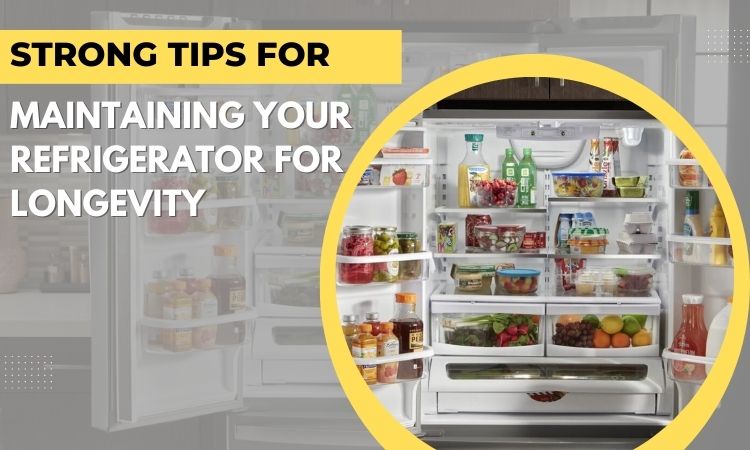Refrigerators are essential appliances in every household, keeping food and beverages fresh and safe. However, refrigerators require proper maintenance to keep them running efficiently and effectively.
Below are major reasons why regular maintenance of your refrigerator is essential:
Increases Efficiency and Saves Energy: Timely maintenance of a refrigerator can help ensure it runs optimally.
Extends Lifespan: With regular maintenance, you can extend the lifespan of your fridge.
NOTE: Refrigerators have a specific lifespan which you must know to buy fridge online and make an intelligent investment.
Prevents Spoilage: A malfunctioning refrigerator can cause food spoilage, leading to waste and potential health hazards.
Reduces Repair Costs: Preventive maintenance can help identify and fix minor issues before they become major problems.
Improves Air Quality: Dust, dirt, and bacteria can accumulate on the coils and filters, causing unpleasant odors and affecting your health.
These reasons are fair enough to educate you about the necessity of timely maintenance. However, not many of you know what involves the proper maintenance of your refrigerator. Below are the pointers you must consider to maintain your fridge and keep it running efficiently.
- Keep the Coils Clean
The condenser coils at the back or bottom of your refrigerator can collect dust and debris over time, reducing the fridge's efficiency. Unplug the fridge and use a vacuum cleaner or a brush to remove dirt, dust, and hair from the coils. It's recommended to clean the coils at least twice a year to ensure optimal performance.
- Check and Adjust the Temperature
The temperature of your refrigerator plays a vital role in keeping your food fresh and safe. Use a thermometer to check the temperature and adjust the settings if needed. A temperature of 35-38°F is ideal for the fridge, while the freezer should be set at 0°F. Also, ensure the fridge's temperature is consistent by keeping the door closed as much as possible and avoiding fridge overloading.
- Keep the Fridge Organized
An organized fridge not only looks good but also helps to maintain its efficiency. Store your food in a way that allows for proper airflow, with the coldest air near the bottom and the warmest near the top. Don't overfill the fridge or block the vents with food items. Also, consider labeling and dating your food to ensure it is used before it spoils.
- Clean the Door Seals
Your refrigerator's door seals are vital in keeping the cold air within. With time, dirt and grime can build up on the seals, causing them to weaken and not seal properly.
Use a damp cloth and mild soap to clean them, then dry them thoroughly. Also, check for any cracks or tears in the seals and replace them if necessary.
- Defrost the Freezer
If your freezer has frost buildup, it can decrease the fridge's efficiency and increase energy consumption. Defrost the freezer at least once a year or when the frost buildup reaches ¼ inch thickness.
You have two ways to do this:
- Turn off the freezer, remove the food, and let the ice melt naturally.
- Use a hairdryer or a bowl of hot water to speed up the process.
- Keep the Door Closed
When you open the fridge door, cold air escapes and warm air enters. This can cause the fridge to work harder to maintain the temperature, increasing energy consumption. To prevent this, close the door as quickly as possible and avoid leaving it open for an extended period.
- Clean the Interior
Spills and stains inside the fridge can lead to unpleasant odors and bacteria growth. Clean the interior of the fridge at least once a month with a mixture of water and mild soap.
You can also use a baking soda solution to remove any odors. Remove all the food items before cleaning and dry the interior thoroughly.
- Check the Water Filter
If your fridge has an ice maker or water dispenser, it likely has a water filter that needs to be changed periodically. A clogged or dirty filter can reduce the quality of your water and ice and even cause damage to the appliance. Check the manufacturer's recommendations for when to change the filter and do so accordingly.
- Keep the Condensation Drain Clear
Most refrigerators have a condensation drain that removes excess moisture from the fridge. It can leak inside the fridge or freezer if this drain becomes clogged.
Locate the drain and clean it with a pipe cleaner or a small brush. You can also pour a mixture of water and vinegar down the drain to help clear any buildup.
- Schedule Regular Maintenance
Regular maintenance can prevent costly repairs and ensure your fridge runs efficiently. Contact a technician to inspect your fridge and perform necessary maintenance, such as replacing worn-out parts, checking the coolant levels, and lubricating the motor. It's recommended to schedule maintenance at least once a year.
This gives you a detailed task list to follow when maintaining your refrigerator. Always follow the manufacturer's instructions and contact a professional if you experience any issues or are unsure about any maintenance tasks.
Above all, if your fridge is over 20 years old, replacing it with a brand-new (and multi-functionality) refrigerator that can serve you for decades is better.
Read More: Small appliances for the kitchen


No comments yet